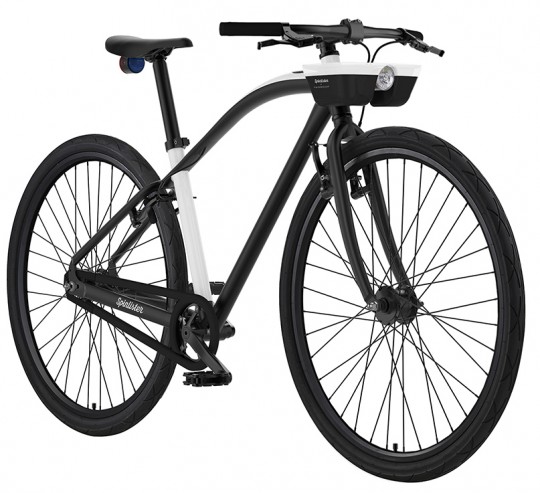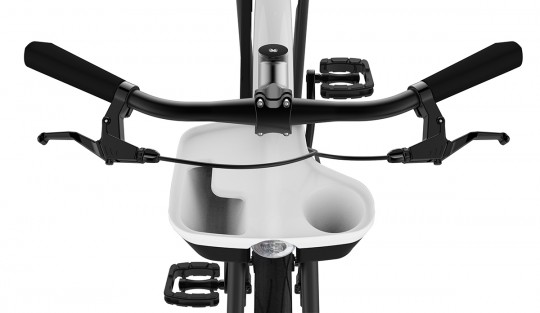Back in 2011, when she cast the lone vote against Portland’s still-unimplemented public bike sharing system, Commissioner Amanda Fritz asked a fair question: If bike sharing is such a good idea, why doesn’t the private sector do it?
It’s taken a little while. But with what looks to be a well-funded launch in Portland this summer, the company Spinlister is trying a novel idea for doing exactly that with their Smart Bike model.
Here’s the twist: every bike in the system would be independently owned by individual Portlanders, who would also pocket the revenues.
The company announced today that starting in “late summer,” Portlanders will be able to order black and white Spinlister-branded shared bicycles equipped with Bluetooth-activated chain locks … for free … and then roll them directly into service on the street.

Then, somewhat like car2go vehicles, the bikes will be parkable anywhere. If you want to use one, you’ll pull up Spinlister’s app, find its parking spot, unlock it and ride away.
Half the revenue from each rental, Spinlister says, will go to each bike’s owner, with the other half going to Spinlister until the bike’s up-front cost is paid off.
Spinlister Chief Marketing Officer Andrew Batey wrote in an email Friday that once each bike is paid off — he predicts they’ll cost between $650 and $900 — the rental rate will revert to Spinlister’s usual share for peer-to-peer bike rentals: 82.5 percent for the owner and 17.5 percent for Spinlister.
As for repairs and maintenance such as tire pumping, Batey said Spinlister is identifying “official bike shop partners” to maintain the bikes.
“In the initial roll out, Spinlister will roll any maintenance needed into the financing,” he added. “However, we’ve intentionally made these bikes to be durable. … Ultimately, I think there will be some minor stuff bike owners will naturally do, but as they’re making money off the bike it’s in their own interest to stay involved as well. The end goal is to get a fleet of these out there, payed off through financing, that collectively create a sustainable bike share model by people, for people.”
As with Spinlister’s existing model, which helps people rent out unused bikes from their garage for cash, people who pay to borrow Spinlister bicycles will waive any claim of liability against Spinlister or the bike’s owner.
“However, in the event something happens, we carry a million dollar liability policy already,” Batey added.
Advertisement
“This new decentralized bike-share model will take the traditional system of a central hub or station, and turn it on its head,” Batey writes in the company’s press release. “From a renter’s perspective, they can simply use the Spinlister app to locate a bike, book it, unlock it and ride away.”
Here are the specs of the branded Vanmoof bikes the company will be selling. They’ll include 28-inch fat racing tires and two gearing options: Sturmey Archer 2-speed kickback shifting or an 8-speed Alfine hub. Batey described them as “high quality bikes that even a hardcore bike enthusiast will enjoy.”
The company will be sharing more details at a 7 p.m. media event this evening at the SXSW festival in Austin. If you want to be among the first to own a floating Spinlister-branded bike, you can sign up here.
“It’s a high quality smart bike that people actually WANT to ride. Simply put, the Spinlister system is better because it’s efficient, self-sustaining, and requires little investment from outside sources.”
— Spinlister CMO Andrew Batey
We’ve written on BikePortland about Spinlister’s existing peer-to-peer rental service several times over the last few years — most recently in January, we wrote about Spinlister’s surprise success here in Portland.
“It baffles me that we have so many bikes here in Portland — with no push from us whatsoever,” Batey told us then. “We didn’t really embrace Portland, Portland embraced us.”
Portlanders have listed about 200 of their own bikes on the service, with average daily rental rates of $20.
Batey and his colleagues are pitching their product with some swagger as an alternative to what they describe as a “broken” model of public bike sharing.
“Our bike share model requires no sponsorship, government assistance, or tax funds to maintain,” Batey writes. “It’s a high quality smart bike that people actually WANT to ride. Simply put, the Spinlister system is better because it’s efficient, self-sustaining, and requires little investment from outside sources.”
This is certainly a fascinating business model, and it’s interesting that it’s probably being launched in Portland because it won’t be competing with public-sector bike sharing. At least not yet.
Update 2:10 pm: I’ve updated this post with much more information about the deal and how it’ll work.


